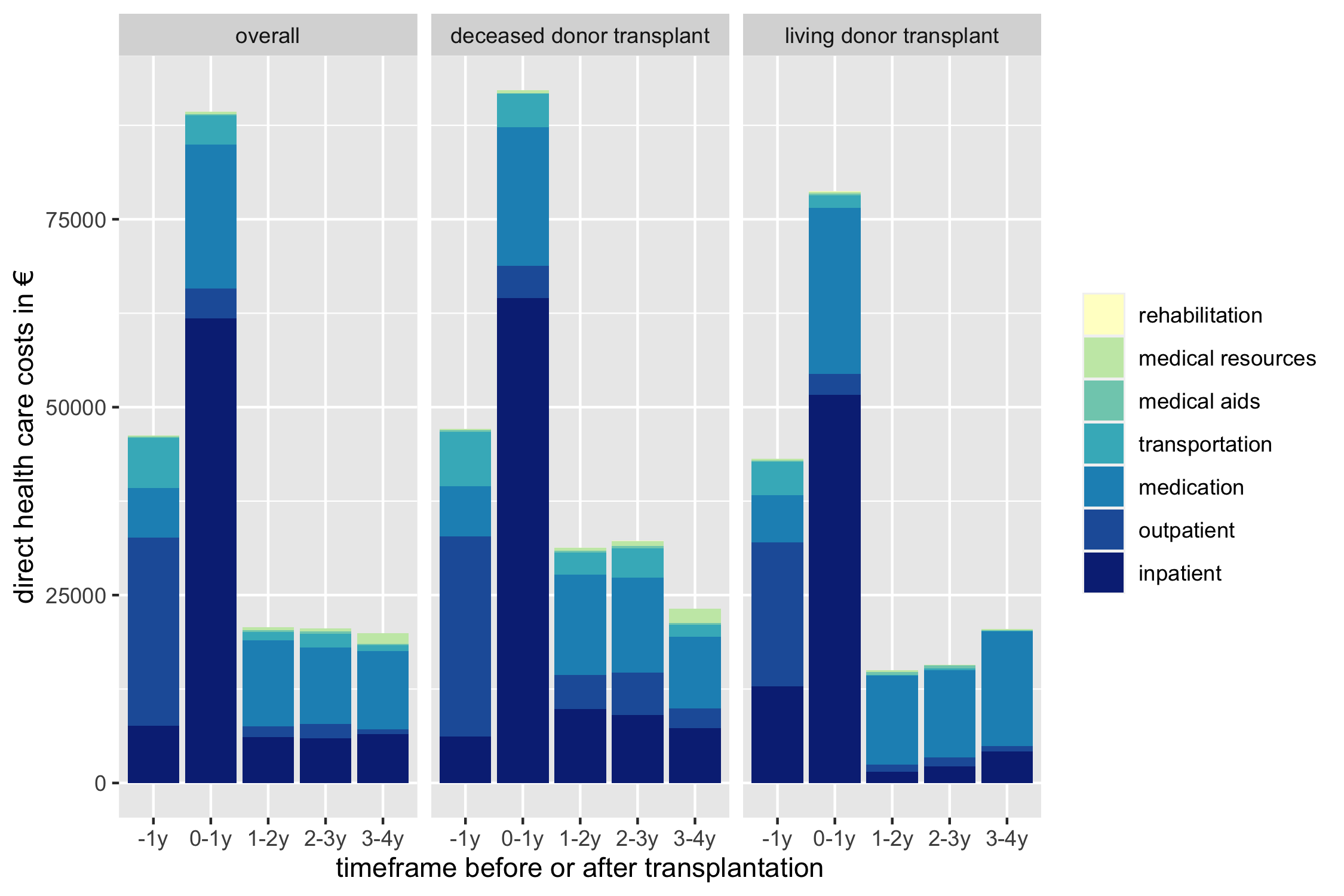Direct Health Care Costs Before and After Kidney Transplantation in Germany – A Longitudinal Analysis Based on Claims Data
S. Ronicke1, K. Budde1, D. Schmidt2, W. Düttmann1, M. G. Naik1, C. J. Wagner3, J. Freitag3, B. Osmanodja1
1Department of Nephrology and Medical Intensive Care, Charité - Universitätsmedizin Berlin, Berlin, Germany, 2Buisiness Unit IT, Charité - Universitätsmedizin Berlin, Berlin, Germany, 3AOK Nordost Statutory Health Insurance Fund, Berlin, Germany
Meeting: 2022 American Transplant Congress
Abstract number: 1610
Keywords: Economics, Kidney transplantation, Public policy
Topic: Clinical Science » Ethics » 23 - Non-Organ Specific: Economics & Ethics
Session Information
Session Name: Psychosocial and Treatment Adherence
Session Type: Poster Abstract
Date: Tuesday, June 7, 2022
Session Time: 7:00pm-8:00pm
 Presentation Time: 7:00pm-8:00pm
Presentation Time: 7:00pm-8:00pm
Location: Hynes Halls C & D
*Purpose: Kidney transplantation can improve long-term survival and quality of life in transplant candidates with end-stage renal disease and has shown to have long-term economic benefits over other modalities of renal replacement therapy in various country-specific settings.
*Methods: The study analyzed claims data of the AOK Nordost statutory health insurance (SHI) fund on adults receiving a living or deceased donor kidney transplant within the study period between January 2015 and December 2018. Data were analyzed longitudinally from 1 year before to up to 4 years after transplantation to determine cost distribution, composition and determinants within this population.
*Results: Baseline characteristics of the study population are shown in table 1.
| Number of subjects | 162 |
| Age (mean) | 55,8 years (SD 11,2 years) |
| Male/female | 100/62 (61,7%/39,3%) |
| Living/deceased donor | 34/128 (21,0%/79,0%) |
| 1st/Re-kidney transplant | 137/25 (84,6%/15,4%) |
| Follow-up (mean) | 586 days (SD 418 days) |
| Pre-transplant Dialysis | 150 (92,6%) |
| Diabetes | 48 (29,6%) |
Average total direct health care cost per patient-year were € 46.258 ($ 52.272) before transplantation, € 89.327 ($ 100.940) in the first year after transplantation and € 19.970 to € 20.705 ($ 22.569 to $ 23.399) in following three years. A summary of cost composition in relation to the date of kidney transplantation for all patients, deceased donor and living donor kidney transplant recipients is shown in figure 1. The majority of costs after transplantation were caused by inpatient treatment and medication.
In comparison with deceased donor cases, living donor transplantation cases showed lower total, inpatient and outpatient costs after transplantation and presented with less hospitalizations and shorter cumulative length of stay after the first month post-transplantation. Kidney related diagnoses caused the majority of inpatient costs after transplantation.
*Conclusions: Kidney transplantation results in health care savings after the year of transplantation. Savings are more pronounced in living donor cases. The observed economic benefits support both deceased and living donor kidney transplantation as long-term economically beneficial treatments.
To cite this abstract in AMA style:
Ronicke S, Budde K, Schmidt D, Düttmann W, Naik MG, Wagner CJ, Freitag J, Osmanodja B. Direct Health Care Costs Before and After Kidney Transplantation in Germany – A Longitudinal Analysis Based on Claims Data [abstract]. Am J Transplant. 2022; 22 (suppl 3). https://atcmeetingabstracts.com/abstract/direct-health-care-costs-before-and-after-kidney-transplantation-in-germany-a-longitudinal-analysis-based-on-claims-data/. Accessed February 27, 2026.« Back to 2022 American Transplant Congress

